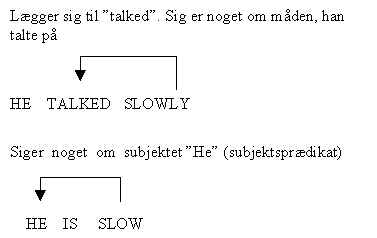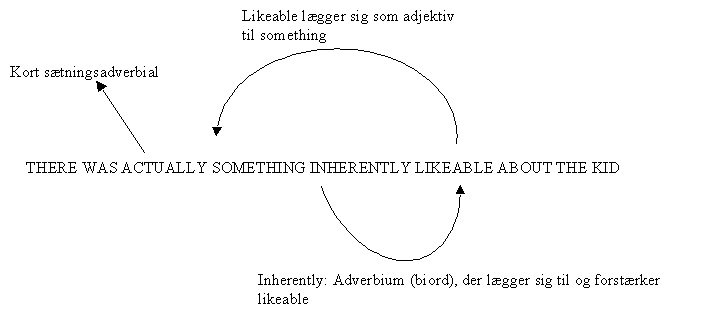
10. TILLÆGSORD (ADJEKTIVER) OG BIORD (ADVERBIER)
a. Tillægsord lægger sig til personer eller ting: "A happy man". "A tall building". ("Happy" lægger sig til "man" og siger noget om ham. "Tall" lægger sig til "building" og fortæller, at den er høj).
b. Biord lægger sig til udsagnsord: He talked slowly (om måden, der taltes på), tillægsord, andre biord eller hele sætninger.
 |
| Biordet siger noget om omstændigheder ved handlingen. Subjektsprædikatet, tillægsordet siger noget om personen |
TILLÆGSORD
| Tillægsagtig stilling | A pretty woman. An extraordinary, old man |
| Omsagnsled til grundled | She is pretty. The woman is pretty |
BIORD
| Lægger sig udsagnsord | I worked quietly and patiently (siger noget om måden, der arbejdedes på) |
| Lægger sig til tillægsord | An extraordinarily old man (siger noget om, hvor gammel manden er) |
| Lægger sig til biord | He moved extremely quickly (siger noget om graden af hurtighed) |
| Lægger sig til en sætning | Naturally, I knew it. I could scarcely believe it (siger noget om hele handlingen) |
Der er tillægsord, der ender på –ly, f.eks. friendly, surly, kindly, likely: "It now seemed likely that…". Her laver man ikke biord ved at sætte –ly på, men ved at lave en anden formulering, f.eks.: "In a friendly manner" (På en venlig måde).
 |
Læg mærke til "good". Det hedder "well" som biord: He spoke well (Han talte godt). Samtidig er "well" et tillægsord, der betyder "rask". Læg også mærke til hard/hardly: He worked hard (hard = biord: Han arbejdede hårdt)/He hardly worked (Han arbejdede næsten ikke)
Navneord (substantiver) anvendes ofte i adjektivisk stilling: "Your fucking dog got kidnapped by some mystery maniac", hvor "mystery" bruges i stedet for "mysterious". Det kan have en stilistisk virkning. Læg også mærke til "An English teacher", hvor tryk og intonation afgør, om "English" er adjektiv (a teacher of English nationality) eller substantiv (a teacher of English).
OMSAGNSLED TIL GRUNDLED (SUBJEKTSPRÆDIKAT)
I sætningerne "She is beautiful" og "She sings beautifully" er beautiful tillægsord i den første sætning og biord, beautifully, i den anden. I den første er beautiful omsagnsled til grundled. Ordet siger noget om personen "she". Det gør det i kraft af, at ordet "to be" er betydningssvagt. Det er næsten lige som et lighedstegn (She = beautiful).
c. Verber, der tager subjektsprædikat kaldes copula. Blandt de almindeligste copula er: Turn: He turned pale, remain, get: "He gets angry too easily" (Han bliver for let vred), look, seem, appear, become og be. Mange af dem kan have to eller flere betydning. Og det er da som betydningssvage, at de har subjektsprædikat. Det gælder f.eks. "grow": "He grew old". I en anden betydning kan ordet binde biord til sig, f.eks.: The plant grew slowly. Eller "prove": "He proved ideally suited to work for land developers". "He proved it to me"
d. Sanseverberne forbindes også med tillægsord, f.eks. feel: "He felt potent when he saw Miss America". Taste: "The apple tastes good. Smell: "The garbage smells bad". Sound: "The band sounded terrible".
Understreg tillægsord og biord i nedenstående sætninger. Hvad lægger tillægsordene sig til? Undersøg "hemispheric"s forskellige positioner i udtalelse 1. I hvilken position er det omsagnsled til grundled?
1."Natural gas is hemispheric. I like to call it hemispheric in nature because it is a product that we can find in our neighborhoods." (hemispheric: Hvad der vedrører den vestlige halvkugle). Austin, Texas, Dec. 20, 2000
2."I am mindful of the difference between the executive branch and the legislative branch. I assured all four of these leaders that I know the difference, and that difference is they pass the laws and I execute them." Washington, D.C., Dec. 18, 2000
3."I knew it might put him in an awkward position that we had a discussion before finality has finally happened in this presidential race."
Sæt ly på i sætningerne herunder, hvor det er nødvendigt:
Indsæt -ly (-y på tillægsord, der ender på –le) de steder, det er nødvendigt (forklar hvorfor):
SUBSTANTIVERING AF TILLÆGSORD (TILLÆGSORD BRUGES SOM NAVNEORD)
e. Et tillægsord kan ikke stå alene i ental. På dansk kan man sige "den fattige". Det kan man ikke på engelsk. Her hedder det: The poor one eller the poor man/woman. The poor alene betyder "de fattige".
f. Almene, generelle begreber kan dog substantiveres i ental: The common good: Det fælles bedste.
|
Interaktive øvelser i adjektiv/adverbium |
|
| Øvelse 1 | Øvelse 2 |
Link her til video om adjektiver/adverbium
SUPPLERENDE ØVELSER
Tilføj –ly, hvor det er
nødvendigt:
This strong glue will do the job nice_____
"Anyway, I'm so thankful_____, and so
gracious_____ that my brother Jeb is
concerned about the hemisphere as well."Miami, Fla., June 4, 2001 (hvilket
ord, der ligner gracious, skulle B. have brugt i stedet for gracious?)
"For every fatal_____ shooting, there were
rough_____ three non-fatal_____ shootings”
"And we need a full_____ affront on an
energy crisis that is real_____ in California and looms for other parts of our
country if we don't move quick_____."—Press conference, Washington, D.C.,
March 29, 2001
He acted without being serious_____
The result is obvious_____, and it is hard_____
inspiring
The children were careful_____ insulated from
harmful_____ experiences
There was sufficient_____ evidence to proceed
careful_____ with the case
An enormous figure was looming menacing_____
out of the darkness
Her kindness cancels out her occasional_____
flashes of temper
Violence is a cancer that is spreading
dangerous_____ at the moment
She is complete_____ homeless
She did not feel complete_____ without her
husband
The children ate the food greedy_____
He moves very quick_____ across the dance floor
Our dog may look very fierce_____, but he
is very friendly
Obvious _______ , he does not know to behave
among heads of state
I remember, perfect______ clear______ , as if
it were yesterday how I crushed my opponents
It was, technical ______ , an ”office” day, but
I pretended to be off duty
The window was so heavy_____ barred I could see
nothing outside
She leaned over and kissed me light______ on
the cheek
The first lady and the president rare_____
kissed
He was silent_____ for a
second then he resumed his speech
Her eyes stared steady______ and constant_____
He work hard______ in the oval office every day
from 8 a.m to 11 a.m.
The rain began to fall again, swift_____ and
direct_____
The president smiled
reassuring_____
He gazed steady_______ at the secretary
She’s very convincing_____, smart_____ dressed,
and easy____ of manner
He muttered desolate_____: What are you doing
to me?
The pilot was awarded, posthumous______, a
medal for his act of heroism
It would seem wrong_____ to do so
He was told a long story about the nature of
the pilot’s fatal_____ wound
He was wounded fatal_____ in the air crash
He never expected such fear and such
terrible______, crushing love
He never expected such fear and such
terrible______ crushing love
I true_____ believe he was glad when he received
the present
It was a true_____ story
I don’t approved of this fast______,
promiscuous______ life you lead
He drove very
fast___________
Sæt –ly endelsen på, hvor det
er nødvendigt:
As the nation's clever______ First Lady, Laura
Bush is keen______ aware of the opportunity she has to share her dedicated_____
love of reading with Americans, especial_______ young children. She will use
her role as First Lady to encourage people to share the pure_____ magic of
reading with children, to encourage Americans to pursue the honorabl______
career of teaching and to showcase early______ childhood development
initiatives that show results on behalf of children.
Indsæt adjektiverne i parentes
som adjektiv eller adverbium:
The man laughed, a very
_______ laugh (creepy)
She laughed _______ (hearty)
The President is a very ________ man (generous)
The man made a remark that Ana thought was
______ harsh (unfair)
She made a ______ mistake (fatal)
Mr. Sorensen thought he might be _______
wounded if he were sent to Jugoslavia (mortal)
_______ the noise was due to the dog barking
(possible)
It is _______ true that Christmas is near
(blissful)
He succumbed to his desire at the worst _______
moment (possible)
The man waited _______ for her snoring, before
he went out to have a beer (patient)
The tigers in Knuthenborg are a ______
_______ sight (true, glorious)
She opened an eye and emitted a ________ _______ cry (hollow, startled)
The dancers in the bar were _______ on some
heavy drugs (probable)
He encouraged him ________ to have another
dring (eager)
He was a _______ handsome member of the human
species (striking)
The water in the river was ______ and _______
(bright, clear)
He swam with ______ ______
strokes (long, soft)
He was in the ______ house. He stumbled _______ forward (wrong,
drunken)
The politician went on and on so ______ about
the _______ failure of _______ action (earnest, sorry, affirmative)
Some people think he is a _______ _______ politician (dangerous, liberal – 2
muligheder i denne indsætning)
He shot _______ of the traffic when he got out
on the motorway (free)
Sæt korrekte endelser (adjektiv/adverbium) i følgende sætninger:
Clarice, their daughter, was bare_____ two years old. A
miscarriage brought on by grief (Imani had lost her fervid_____ environmentalist
mother to lung cancer short____ after Clarice's birth; the asbestos ceiling in
the classroom where she taught first-graders had leaked for 4o years) separated
Clarice's birth from the new pregnancy. Imani felt her body had been assaulted
by these events and was, in fact, considerabl_____ weakened and was also, in any
case, chronical_____ anemic_____ and run-down. Still, if she had wanted the baby
more than she did not want it, she would not have planned to abort it.
Oversæt:
Hvis du fejler, så er det din
egen skyld. Det er meget amerikansk at tænke sådan. Amerikanerne er
individualistiske, og de tænker som individualister. De bebrejder ikke en svag
stat, hvis det ikke lykkes for dem at få succes. Den amerikasnek drøm gør så,
at amerikanerne ikke har lyst til at betale til for meget velfærd. Den amerikanske drøm er fuldstændig ens,
hvadenten man spørger en fattige eller en rig amerikaner. I USA er det svært at
få folk til at stemme på baggrund af deres klasse. Folk tænker simpelthen ikke
på den måde. Det har overrasket ambitiøse politikere. Man skulle tro, at hvis
du som politiker foreslog, at man skulle
beskatte de rige noget mere, så ville de fattige stemme på dig. Men sådan er
det ikke i USA. Her kan det være de fattige, der er imod en sådan politik. Den
fattige tænker: Jeg skal ikke altid være fattige, og når jeg bliver rig, så vil
have lov til at beholde de gode penge, jeg har tjent ved ærligt arbejde.
Hvordan bruger forfatteren adjektiver og adverbier i sin personkarakteristik (characterization) i teksten herunder:
The Westcotts were going out for dinner that night, and when Jim came home, Irene was dressing. She seemed sad and vague, and he brought her a drink. They were dining with friends in the neighbourhood, and they walked to where they were going. The sky was broad and filled with light. It was one of those splendid spring evenings that excite memory and desire, and the air that touched their hands and faces felt very soft. A Salvation Army band was on the corner playing "Jesus Is Sweeter" Irene drew on her husband's arm and held him there for a minute, to hear the music. "They're really such nice people, aren't they?" she said. "They have such nice faces. Actually, they're so much nicer than a lot of the people we know." She took a bill from her purse and walked over and dropped it into the tambourine. There was in her face, when she returned to her husband, a look of radiant melancholy that he was not familiar with. And her conduct at the dinner party that night seemed strange to him, too. She interrupted her hostess rudely and stared at the people across the table from her with an intensity for which she would have punished her children.